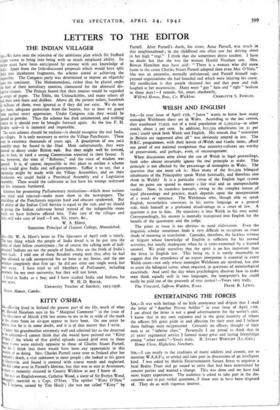WELSH AND ENGLISH
SIR,—In your issue of April 17th, " Janus " wants to know how many monoglot Welshmen there are in Wales. According to the last census, they numbered 77,932, out of a total population of 2,593,014—in other words, about 3 per cent. In addition, 811,329 inhabitants (or 31 per cent.) could speak both Welsh and English. His remark that " minorities in Britain are oppressed after all" was obviously uttered in jest. The B.B.C. programmes, with their leaven of -Welsh and Gaelic items, afford one proof of our national recognition that minority-cultures arc worthy of preservation, and perhaps, even, of encouragement.
When discussions arise about the use of Welsh in legal proceedings, both sides almost invariably ignore the real principle at stake. This principle is not affected by the percentage of monoglots in Wales. The question that one must ask is: How many of the 811,329 bilingual inhabitants of the Principality speak Welsh habitually, and therefore also think in Welsh? It is a particular virtue of the English legal system that no pains are spared to ensure a fair trial and an unimpeachable verdict. Now, in countless lawsuits, owing to the complex nature of legal phraseology and practice, much depends upon the interpretation of a word or sentence. The Welshman who, though able to speak English, nevertheless converses in his native language as a general rule, finds himself at a profound disadvantage in a court of law. A question is put to him. He translates it into Welsh in his own mind. Correspondingly, his answer is mentally transposed into English for the benefit of the questioner and the judge.
The point at issue is too obvious to need elaboration. Even the linguistic scholar sometimes finds it very difficult to recapture an exact shade of meaning in translation. Consider, therefore, the luckless witness or litigant whose knowledge of English is sufficient for his normal activities, but totally inadequate when he is cross-examined by a learned counsel. We pride ourselves that the spirit is no less important than the letter in English law. This being so, it is surely reasonable to suggest that the attendance of an expert interpreter is essential in every Welsh court—not only where monoglot Welshmen are involved, but also to assist the bilingual suitor, when required, in questions of terminological exactitude. And until the day when psychologists discover how to make men think equally well in two languages, the interpreter's fee could easily be paid out of the proceeds of true justice!—Yours very truly,
The Vineyard, Saffron Walden, Essex. FRANK R. LEWIS.






















 Previous page
Previous page